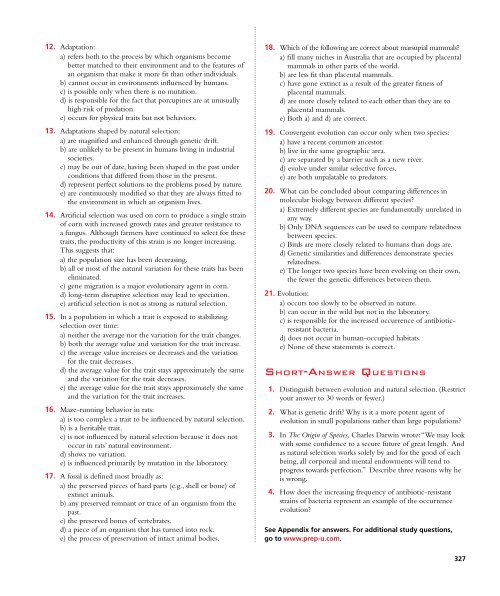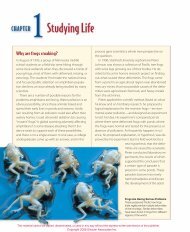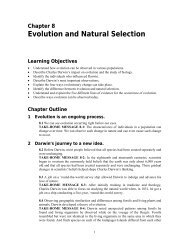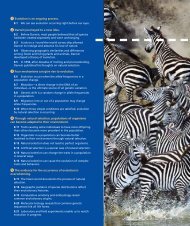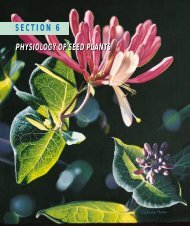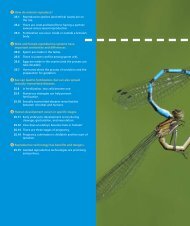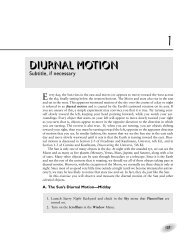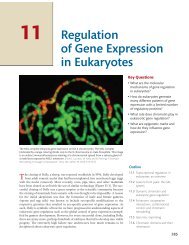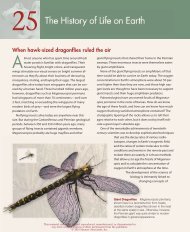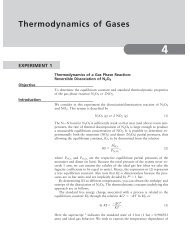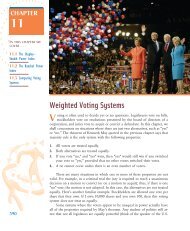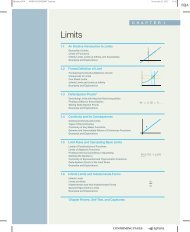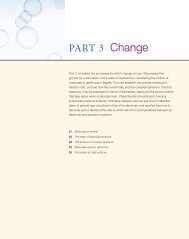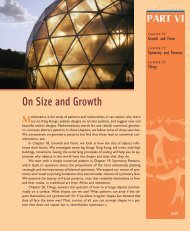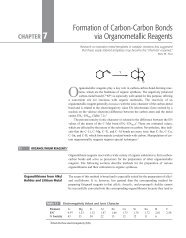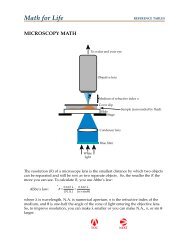Evolution and Natural Selection - W.H. Freeman
Evolution and Natural Selection - W.H. Freeman
Evolution and Natural Selection - W.H. Freeman
Create successful ePaper yourself
Turn your PDF publications into a flip-book with our unique Google optimized e-Paper software.
12. Adaptation:<br />
a) refers both to the process by which organisms become<br />
better matched to their environment <strong>and</strong> to the features of<br />
an organism that make it more fit than other individuals.<br />
b) cannot occur in environments influenced by humans.<br />
c) is possible only when there is no mutation.<br />
d) is responsible for the fact that porcupines are at unusually<br />
high risk of predation.<br />
e) occurs for physical traits but not behaviors.<br />
13. Adaptations shaped by natural selection:<br />
a) are magnified <strong>and</strong> enhanced through genetic drift.<br />
b) are unlikely to be present in humans living in industrial<br />
societies.<br />
c) may be out of date, having been shaped in the past under<br />
conditions that differed from those in the present.<br />
d) represent perfect solutions to the problems posed by nature.<br />
e) are continuously modified so that they are always fitted to<br />
the environment in which an organism lives.<br />
14. Artificial selection was used on corn to produce a single strain<br />
of corn with increased growth rates <strong>and</strong> greater resistance to<br />
a fungus. Although farmers have continued to select for these<br />
traits, the productivity of this strain is no longer increasing.<br />
This suggests that:<br />
a) the population size has been decreasing.<br />
b) all or most of the natural variation for these traits has been<br />
eliminated.<br />
c) gene migration is a major evolutionary agent in corn.<br />
d) long-term disruptive selection may lead to speciation.<br />
e) artificial selection is not as strong as natural selection.<br />
15. In a population in which a trait is exposed to stabilizing<br />
selection over time:<br />
a) neither the average nor the variation for the trait changes.<br />
b) both the average value <strong>and</strong> variation for the trait increase.<br />
c) the average value increases or decreases <strong>and</strong> the variation<br />
for the trait decreases.<br />
d) the average value for the trait stays approximately the same<br />
<strong>and</strong> the variation for the trait decreases.<br />
e) the average value for the trait stays approximately the same<br />
<strong>and</strong> the variation for the trait increases.<br />
16. Maze-running behavior in rats:<br />
a) is too complex a trait to be influenced by natural selection.<br />
b) is a heritable trait.<br />
c) is not influenced by natural selection because it does not<br />
occur in rats’ natural environment.<br />
d) shows no variation.<br />
e) is influenced primarily by mutation in the laboratory.<br />
17. A fossil is defined most broadly as:<br />
a) the preserved pieces of hard parts (e.g., shell or bone) of<br />
extinct animals.<br />
b) any preserved remnant or trace of an organism from the<br />
past.<br />
c) the preserved bones of vertebrates.<br />
d) a piece of an organism that has turned into rock.<br />
e) the process of preservation of intact animal bodies.<br />
18. Which of the following are correct about marsupial mammals?<br />
a) fill many niches in Australia that are occupied by placental<br />
mammals in other parts of the world.<br />
b) are less fit than placental mammals.<br />
c) have gone extinct as a result of the greater fitness of<br />
placental mammals.<br />
d) are more closely related to each other than they are to<br />
placental mammals.<br />
e) Both a) <strong>and</strong> d) are correct.<br />
19. Convergent evolution can occur only when two species:<br />
a) have a recent common ancestor.<br />
b) live in the same geographic area.<br />
c) are separated by a barrier such as a new river.<br />
d) evolve under similar selective forces.<br />
e) are both unpalatable to predators.<br />
20. What can be concluded about comparing differences in<br />
molecular biology between different species?<br />
a) Extremely different species are fundamentally unrelated in<br />
any way.<br />
b) Only DNA sequences can be used to compare relatedness<br />
between species.<br />
c) Birds are more closely related to humans than dogs are.<br />
d) Genetic similarities <strong>and</strong> differences demonstrate species<br />
relatedness.<br />
e) The longer two species have been evolving on their own,<br />
the fewer the genetic differences between them.<br />
21. <strong>Evolution</strong>:<br />
a) occurs too slowly to be observed in nature.<br />
b) can occur in the wild but not in the laboratory.<br />
c) is responsible for the increased occurrence of antibioticresistant<br />
bacteria.<br />
d) does not occur in human-occupied habitats.<br />
e) None of these statements is correct.<br />
Sh o r t -An s w e r Qu e s t i o n s<br />
1. Distinguish between evolution <strong>and</strong> natural selection. (Restrict<br />
your answer to 30 words or fewer.)<br />
2. What is genetic drift? Why is it a more potent agent of<br />
evolution in small populations rather than large populations?<br />
3. In The Origin of Species, Charles Darwin wrote: “We may look<br />
with some confidence to a secure future of great length. And<br />
as natural selection works solely by <strong>and</strong> for the good of each<br />
being, all corporeal <strong>and</strong> mental endowments will tend to<br />
progress towards perfection.” Describe three reasons why he<br />
is wrong.<br />
4. How does the increasing frequency of antibiotic-resistant<br />
strains of bacteria represent an example of the occurrence<br />
evolution?<br />
See Appendix for answers. For additional study questions,<br />
go to www.prep-u.com.<br />
327


